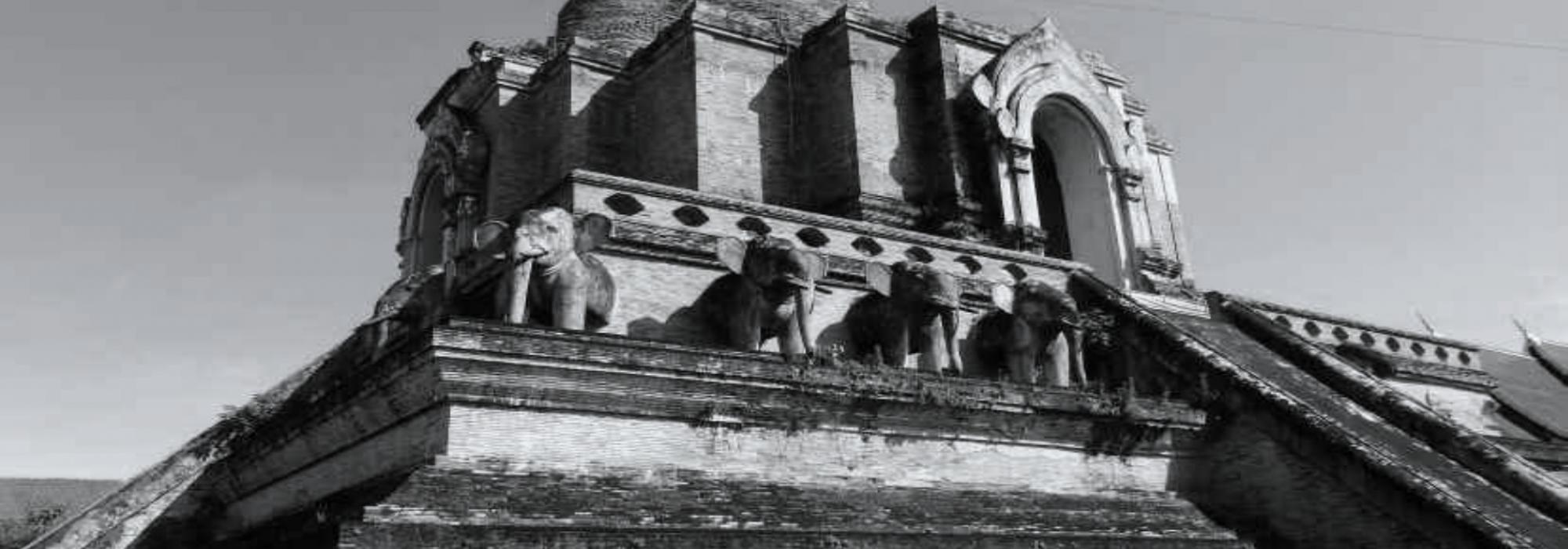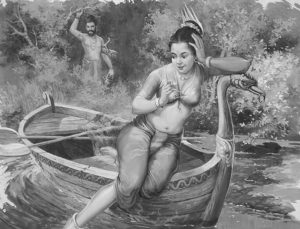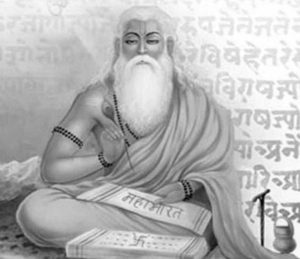The fifty-seventh adhyāya of the Ādi-parva starts with the story of King Uparicara. Some scholars opine that this is the real beginning of the Bhārata epic because Uparicara’s daughter Matysagandhī (also called Satyvavatī, Kālī, Yojanagandhī, and Gandhavatī) is the mother of Vyāsa, who is the ancestor of both the Kauravas and the Pāṇḍavas. This section narrates the incidents that led to her becoming the daughter of a fisherman and the birth of Vyāsa through Parāśara; several fantastic explanations have been given to support these episodes.
Following this, until the end of adhyāya 61, we learn that the men and women of the Bhārata epic were born out of several celestial beings like the devas, dānavas, and gandharvas to rid the earth of evil. In the beginning, Vaiśampāyana only suggests this. However, Janamejaya is not satisfied and asks him to narrate the story in its entirety. Vaiśampāyana agrees and starts the narration from the story of Brahma – Brahma created six children from his mind: Marīci, Atri, Aṅgirasa, Pulastya, Pulaha, and Kratu. It further goes on to enumerate which celestial being was born to which terrestrial couple (typically, the good possess elements of the devas while the evil possess elements of rākṣasas). Janamejaya gets tired of these details and says, “Now tell me the details of the Kuru-vaṃśa.” Vaiśampāyana starts narrating the story of King Duṣyanta, who lived nine generations before King Kuru. Dhṛtarāṣṭra and Pāṇḍu come nine generations after Kuru. During the narration of the story, ancestors and descendants of those in the Bhārata lineage are described, making it a total of forty-eight generations. (Adhyāya 90).
Translators' notes
The story of Uparicara
There lived a righteous king called Uparicara. He liked hunting and used to go out to hunt everyday. One day, however, he got tired of it and felt that he should stop killing animals. He kept aside his weapons and sat down in the forest to deep penance. Indra and the other deities thought that Uparicara was performing the penance to usurp Indra’s status. They came down to the earth and did their best to turn him away from the penance.
The deities came and spoke to him thus – “You are greatly harming the world and dharma. If you give up taking care of the kingdom, goodness will vanish from Earth. Without a king, people will become reckless. It is thus only befitting that you go back to your throne’
Indra, too, said to him: “Uparicara, are you performing such intense penance to acquire greater worlds after death? If so, you need not perform any penance to acquire them. By merely ruling your kingdom with a dhārmic vision, you can gain the best of all worlds. So please continue as the king on earth and I will remain the king of the heavens. Let us be friends hereafter. Ask for any kingdom on earth, I will give it to you. Perhaps the kingdom of Cedi best suits you. It is filled with every conceivable richness and is like heaven on earth. The people of that land are kind and generous; saints and sages rejoice there. People belonging to all the four varṇas are always devoted to their responsibilities. You may become the king of such a land.
As the fruit of the penance you have performed so far, I shall give you boons – you will get to know everything that takes place in the three worlds. I will gift you a celestial flying-chariot. You will be the only person on earth to possess it. Along with this, I shall gift you the Vaijayantī garland made of lotuses. This garland never dries up and a person who wears this in battle can never be injured by any weapon. This will be known as Indramālā in the world. You will be known as the wearer of Indra’s garland.” Saying this, Indra not only gifted him with the flying chariot and the Vaijayantī garland, but also gave him a bamboo stick (vaiṇava-daṇḍa). The daṇḍa could not only fulfil all wishes, but could also protect the good. Uparicara received the daṇḍa from Indra and worshipped it with great devotion.
Then, Indra assumed the form of a swan and took up abode in the stick. Impressed by Uparicara’s devotion, Indra said ‘Following the great model set by Uparicara, if other earthly kings worship me in the form of a yaṣṭi with devotion, they will be blessed with great wealth and victory. The citizens will always be full of riches and happiness’(This ‘yaṣṭi-pūjā’ that Uparicara started is followed by royal families even today. On the first day of the new year, Indra in the form of a swan is invoked on the top of a tall stick. The stick is decorated and worshipped with grand rituals)
Uparicara, thus gave up his penance and became the king of Cedi. He regularly performed yāgas and Indrotsava on a great magnitude. He had five sons, all brilliant in character. He crowned his son Bṛhadratha as the king of Magadha. Pratyagra, Kuśāmba (Maṇivāhana), Māvella and Yadu were his other children. He named four provinces after his children and anointed them as the kings of the respective provinces. Having thus divided the earth between his five children, Uparicara always remained in his celestial chariot in the skies. His name thus found its real meaning – Uparicara – ‘the one who moves above’ (i.e., moves in the skies)
The birth of Satyavatī
Once, when the king Uparicara was roaming around the skies, he observed that the river Śuktimatī had got stagnated. On a closer examination, he found that a mountain named Kolāhala had stopped the river by force. Angered by the mountain’s insolence, Uparicara stepped on him and the mountain broke apart. Śuktimatī then started flowing through the cleavage thus formed. She gave him her two children who were born out of the mountain Kolāhala. She then continued on her journey to meet her real husband, the ocean. The children who were handed over by Śuktimatī were already adults. Uparicara made the young man commander-in-chief of his armies and married the lady. The lady, Girikā who was of a sweet and good nature, fell deeply in love with Uparicara. The king too could not stay away from her for even a moment. Ministers took care of their kingdom.
Once, Girikā, who longed to give birth to a son, approached Uparicara. At the same time, however, the ancestors of
Uparicara came down to him in their physical form and asked him for ‘śrāddha-bhojana’ (the food offered to ancestors during yearly death ceremonies). They asked for the meat of a deer. Although the king wanted to be with his beloved wife Girikā, he could not turn down his forefathers’ request and went to the forest in search of deer, but with his heart and mind still lingering on Girikā.
He had his ancestors seated and headed to the forest for hunting. As the spring season (vasanta) was at its peak in the forest, the king felt that he was in the celestial gardens of Kubera. Trees and creepers were filled with flowers and seemed to reflect Girikā’s youth. The king grew jealous of the bees that were getting to kiss different flowers to extract their nectar. Tired physically from walking and exhausted emotionally, the king laid himself down by an Aśoka tree. Malayamāruta, the soft breeze that carried the fragrance of different flowers, kindled sensual feelings in the king. The king imagined that the splendid nature around him was a manifestation of his beautiful wife Girikā, and he experienced an ejaculation of his sperm. The next moment, he gathered it in a tree’s leaf and thought that his sperm should not go waste; Girikā was also ready to conceive. He spoke to an eagle that was near him:
“Dear bird! Kindly carry my sperm and hand it over to my wife Girikā in the palace. She is ready to conceive.” The eagle immediately consented, grasped the sperm in his claws and took to flight at great speed. The eagle was sighted by another eagle which took the sperm for a piece of meat and attacked it. In the fight that ensued, the sperm fell into the river Yamunā.
An apsarā named Adrikā, who was cursed to take the form of a fish in the river Yamunā, had been waiting for hundreds of years to receive Uparicara’s seed. As it fell into the waters, she engulfed it within her womb. After nine months, as pre-destined, she fell into the hands of fishermen. The fishermen were astonished at her strange form. They carefully cut open her womb, and two dazzling babies came out. The apsarā, who had taken the form of a fish due to the curse of a brāhmaṇa, now assumed her real form, blessed her babies and went back to the heavens.
The fishermen thought the babies were somehow extraordinary, and reported the events to their king. The king adopted the boy and handed over the baby girl to the king of the fishermen. This male child grew up to become famous as ‘Matsyarāja'. The girl who grew up with the king of fishermen became famous as Matsyagandhā. Even as a girl, she was good natured, charming and beautiful. She was therefore also called ‘Satyavatī by her foster parents. She took care of ferrying people, one at a time, across the river Yamunā. Pleased with her skill, travellers used to reward her some money, which she always handed over to her father.
The birth of Vyāsa
Once, the sage Parāśara during his travels happened to come to the banks of the river Yamunā. Satyavatī was the only ferry woman present when he arrived. Satyavatī’s beauty was such that it could even capture the hearts of the learned sages. Parāśara, who knew that she was of a divine birth, expressed his wish to have venereal bliss in her company, as they were riding on the boat. In reply, Satyavatī said that she was embarrassed as both the banks of the
river had hermitages of sages and it would catch their sight. Parāśara then created a foggy envelope around the boat and created privacy. As Satyavatī expressed her concerns about losing virginity, he said with a smile ‘After being with me, you will regain your virginity. You do not have to get pregnant like other women. With my blessings, you will give birth to a brilliant son immediately. If you have any other wishes, please ask me and I shall fulfil them too.’
Satyavatī thought for a moment and requested him to rid her of fish’s smell that had come to her by birth. With the sage’s blessings, the bad odour was removed from her body and she also became fragrant. As her fragrance could be felt even at large distances (as far as a ‘yojana’) she came to be called ‘Yojanagandhā’. Satyavatī was thrilled and she fell into the sage’s arms. A brilliant son was born to them in the middle of an island of the river Yamunā. He bowed down to his mother and sought her permission to perform penance. He promised to come to her whenever she thought of him. The child later became famous as Kṛṣṇa-dvaipāyana - Kṛṣṇa, as he had a dark complexion and dvaipāyana, as he was born in a dvīpa, an island. He reorganised the Vedas into four and came to be called Veda- vyāsa, i.e., the re-organiser/ re-classifier of the Vedas. He also composed the Mahābhārata that is considered the fifth Veda.
To be continued.
Thanks to Śatāvadhāni Dr. R Ganesh for his astute feedback.

















































